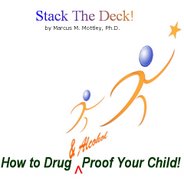- The three leading causes of death among adolescents — unintentional injuries, homicide, and suicide — as well as unsafe sexual behavior are closely yoked to alcohol use.
- A study of adolescents’ emergency room visits found that 40% had a positive blood alcohol level.
- A major national study found that 40% of parents think they have little influence over their adolescent’s decision to use drugs or not.
- Approximately 45 percent of parents indicate that it is likely their teens will use illegal drugs.
- By the age of 17 approximately 12 percent of adolescents can be categorized as at risk for substance abuse.
- There is a genetic component associated with the presence of alcohol or drug dependence.
- In the same way that diabetes, or hypertension, or breast cancer can run in families, so too is this true of alcohol or drug dependence.
- Adolescents consistently have a very inaccurate perception of actual alcohol and drug use patterns. For example, one study found that high school students thought that twice as many of their peers were regular weekly drinkers than was actually the case.
Appreciate Your Influence
Parental influence operates as a natural harm-reduction mechanism that helps protect teenage drinkers from developing alcohol problems.
Parents influence their children’s drinking through family interactions, modeling and reinforcing standards, and attitudes that children learn and use to guide their behavior in new situations. Thus, parental influences endure.
An important predictor of whether a teenage boy will have an alcohol related driving offense or accident, is whether his parents are negative (rather than neutral) about teenage drinking.
The quality of family relationships and the amount of time adolescents spend with family is a more important influence on adolescent’s substance use than is the kind of family in which teenagers are living, whether it is with both parents, a parent or step-parent, in a single parent home, or live with non-family members.
Adolescents’ perceptions of the parenting style in their home are linked to their substance use. Teens who view their parents generally as authoritative (know what they are talking about), as not permissive (who have standards and clear expectations), and as less authoritarian (“do it because I say so”) do better in school and also are less likely to use substances.
Experimentation and use among elementary age children is associated with parenting styles that encourage risk taking, by parent's substance use.
Adolescent drinking behavior is found to be largely unrelated to the socio-economic circumstances of the family. A supportive family environment is associated with lowered rates of alcohol use.
Parents’ health habits influence their children. This goes from wearing bike helmets, to using seat belts, to drinking patterns and being a smoker. The younger the child the more powerful is the parent’s model.
If you have any concern about your own substance use, act on this. People don't often worry about their alcohol or drug use needlessly. If you are a smoker, maybe now is the time to quit.
Get Stack The Deck: How to Drug & Alcohol Proof Your Child
www.Prevent-Drug-Abuse.com

